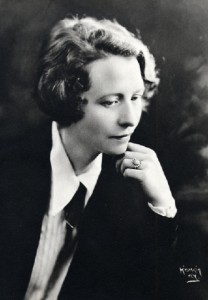 As its title suggests, Edna St. Vincent Millay’s “Conscientious Objector” contains heavy anti-war tones; but it can also be read as a simple, but potent, protest against death in general. Millay is unabashed in her views right from the get-go, opening with, “I shall die, but that is all that I shall do for Death” (Millay 1). The poet recognizes that death is inevitable, but she is not pleased about it. She is willing to give herself over, but she is not going to do so without putting up a fight first. In the next stanza she creates the image of Death riding a horse to travel for his “business” (Millay 3). She writes, “But I will not hold the bridle while he cinches the girth./And he may mount by himself: I will not give him a leg up” (Millay 4-5). Millay will not make it any easier for Death to do his job; she will not give him any special assistance. Her use of the phrase “leg up” has two meanings here: both that she will literally not help Death get up onto his horse, and that she will not help make Death more successful.
As its title suggests, Edna St. Vincent Millay’s “Conscientious Objector” contains heavy anti-war tones; but it can also be read as a simple, but potent, protest against death in general. Millay is unabashed in her views right from the get-go, opening with, “I shall die, but that is all that I shall do for Death” (Millay 1). The poet recognizes that death is inevitable, but she is not pleased about it. She is willing to give herself over, but she is not going to do so without putting up a fight first. In the next stanza she creates the image of Death riding a horse to travel for his “business” (Millay 3). She writes, “But I will not hold the bridle while he cinches the girth./And he may mount by himself: I will not give him a leg up” (Millay 4-5). Millay will not make it any easier for Death to do his job; she will not give him any special assistance. Her use of the phrase “leg up” has two meanings here: both that she will literally not help Death get up onto his horse, and that she will not help make Death more successful.
The following stanza reveals an even more defiant Millay. She writes that no matter what Death does to her, even torture, she will not give him any details about where anyone is. This she refuses to do, even if “he flick my shoulders with his whip” (Millay 6) and has “his hoof on my breast” (Millay 7). Millay is resolute in her stance against Death. She makes her point more blatantly in the next section of the poem: “I will not tell him the whereabouts of my friends nor of my enemies either” (Millay 9). Millay feels so strongly about her position that she even protects her enemies. She reinforces her opening point, and the metaphor of not being Death’s assistant, by stating, “I shall die, but that is all that I shall do for Death; I am not on his pay-roll” (Millay 8). Because Death doesn’t pay her anything, Millay feels no duty to him. Therefore she doesn’t have to help him in any way.
The last lines of the poem show the loyalty Millay has for mankind: “Brother, the password and the plans of our city are safe with me; never through me/Shall you be overcome” (Millay 12-13). By using the word “brother,” Millay shows her compassion for others. Though in this context it’s likely that Millay is referring to soldiers in the war, there is no doubt she feels this sentiment toward all people. She will never be the agent of death; no one will be “overcome” on her account, and she feels a distinct pride in this role of protecting people’s lives.

 “Conscientious Objector” by Edna St. Vincent Millay
“Conscientious Objector” by Edna St. Vincent Millay



 First the Wealth Gap, Now the U.S. Has a Growing Health Gap
First the Wealth Gap, Now the U.S. Has a Growing Health Gap
 How to Comfort A Dying Loved One
How to Comfort A Dying Loved One
 Our Annual Seven Holiday Gifts for Someone Who Is Grieving, 2024 Edition
Our Annual Seven Holiday Gifts for Someone Who Is Grieving, 2024 Edition














